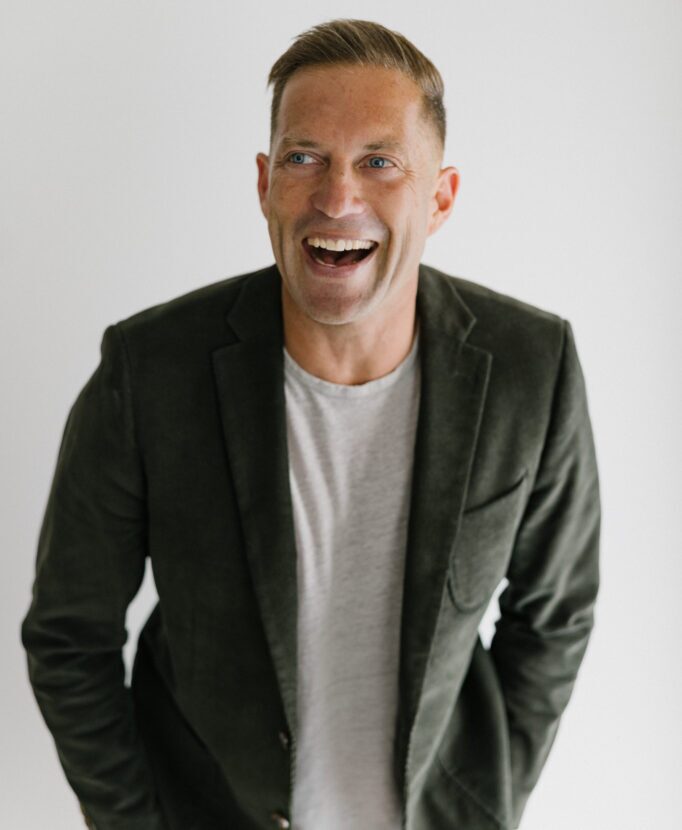Celeb Shot
Growing Without Trauma: Lessons From Post-Traumatic Growth
Keynote speaker and author, Sebastian Terry, shares his insights on how we can harness the principles of Post-Traumatic Growth (PTG) to thrive, without needing to endure the trauma first. Learn how to build resilience, find deeper meaning, and live a richer life in and out of the workplace.

What if we could grow without suffering?
Life has a way of throwing curveballs — some small, some life-altering. Often, it’s in the face of adversity that we find out who we really are. We’ve all heard stories of people who emerge from hardship with a newfound sense of purpose, stronger relationships, or a clearer vision of what truly matters. This phenomenon is called Post-Traumatic Growth (PTG).
I guess I’m a good example of this; at 25 years old, I myself went through the trauma of losing a childhood friend, by the name of Chris. His tragic loss made me reflect first on his life and then mine. Realizing for the first time that life is fragile, I simply wondered if I was happy with the way I was living my own. My answer was no. In a moment of instant perspective, I decided to change my life by way of creating a bucket list that I hoped would bring me closer to a sense of happiness and even purpose. Sixteen years on, and my life has not only changed, but the impact of my bucket list has created a ripple effect of positivity for millions of people around the world.
But here’s the million-dollar question: Do we actually have to go through trauma in order to grow, find happiness and make positive change?
What if we could learn the lessons of PTG — the clarity, the resilience, the gratitude — without enduring something catastrophic? What if we could tap into the benefits of growth now, in our everyday lives and careers, instead of waiting for life to shake us up?
The good news? We can. And here’s how.
1. Reframe Challenges Before They Become Crises
One of the biggest lessons from PTG is that growth happens when we’re forced to re-evaluate our lives. People who’ve gone through extreme hardship often come out the other side with a new perspective. They realize what truly matters and let go of what doesn’t.
But why wait for a crisis to make that shift?
By proactively questioning our own beliefs, goals, and values, we can build the same clarity before life forces it upon us. In my breakout session, I have people write their eulogies, as if today were their last. At first, it’s certainly a confronting exercise, but the results of this simple task have changed the lives of many people and teams with whom I’ve been fortunate enough to work. If a eulogy is a little too intense to consider right now, you could ask yourself these simple questions:
- Am I living in alignment with what I truly care about?
- If I lost everything tomorrow, what would I regret not doing?
- What’s one small change I can make today that aligns my life with my values?
These questions create space for intentional change — no trauma required.
2. Strengthen Your Resilience Muscle Now
People who experience PTG develop an almost superhuman level of resilience. They become adaptable, mentally tough, and emotionally strong. But resilience isn’t something you’re born with — it’s built through small, everyday challenges.
If you want to grow without trauma, practice resilience before you need it.
- Seek Discomfort: Try something new. Do the thing that takes you out of your comfort zone. These moments of controlled struggle build the emotional endurance needed for life’s bigger battles. What’s that big goal or dream that makes you nervous as you think about trying to achieve it? Now might be the best time to try!
- Reframe Setbacks: Instead of fearing failure, start seeing it as data. Every misstep teaches you something. In my quest to check off number 18 from my list (hit a hole in one!), I’ve taken over 10,000 shots from various golfing hotels around the world. Guess what, I still haven’t got it! It’s this journey of embracing the failure that has become my favorite part.
- Develop a ‘Challenge’ Mindset: Instead of saying, “Why is this happening to me?” start asking, “How can I grow from this?” Small acts of resilience today prepare you for whatever life throws at you tomorrow.
3. Cultivate Meaning — Don’t Wait for It to Find You
One of the biggest gifts of PTG is a sense of meaning. People who go through hardship often say they have a stronger sense of purpose afterward. But here’s the thing: meaning isn’t something that magically appears. It’s something we create. Often, when working with groups on stage or in breakout environments, I discuss ACTION as the first step in uncovering passion and purpose (both in and out of the workplace).
If you want a life rich with meaning, start now.
- Find Small Ways to Help Others: Studies show that contributing to something bigger than yourself creates fulfillment. Although my own journey started with the pursuit of my own goals, I quickly found that helping others achieve their own goals filled me with just as much, if not more, satisfaction. It started by pushing a quadriplegic gentleman in his wheelchair so that he could complete a half marathon and now I’m fortunate enough to grant the dreams of audience members, live from stage as part of an experiential keynote, often leading to tears, laughter and a standing ovation for the recipient!
- Reassess Your ‘Why’ in Work and Life: Ask yourself, why do I do what I do? If the answer feels hollow, explore ways to inject more purpose into your daily life and role. Purpose can be cultivated and discovered in any role, whether as a family member, community member, or team member.
Purpose is not the result of pain. It’s the result of perspective.
4. Build Deep Connections Before You Need Them
After a major life event, people often realize how much they value their relationships. They reconnect with loved ones, invest in friendships, and build stronger communities. Not only that during times of hardship, it’s our friends and family that help us through.
In fact, over the past 16 years of interviewing thousands of people on the topic of bucket lists, I found that a lack of community is one of the top 3 reasons why people do not achieve their most meaningful goals! The other two reasons revolve around a lack of clarity or vision on our goals and the unhealthy relationship to fear (we can dive into this in my next article!).
So why wait for tragedy to prioritize human connection?
- Make Time for People Now: Don’t let busyness become an excuse for disconnection. Schedule coffee dates, call your friends, be present with your family.
- Open Up and Be Vulnerable: You don’t have to go through trauma to have deep, meaningful conversations. Authenticity strengthens relationships now.
- Create a Support System Before You Need One: Build a network of people who challenge, inspire, and support you — so that when challenges do come, you’re not facing them alone.
Connection is the foundation of growth. Nurture it before you need it.
5. Embrace Gratitude as a Daily Habit
Survivors of hardship often say they appreciate life more than they ever did before. They stop sweating the small stuff. They find joy in everyday moments.
But you don’t need to go through something devastating to develop gratitude — you just need to make it a habit.
- Start a Daily Gratitude Practice: Write down three things you’re grateful for each day. Over time, this rewires your brain to focus on abundance instead of lack. As an example, I’m grateful for Washington Speakers Bureau to invite me to write an article that I hope creates impact for YOU, the reader.
- Savor Small Moments: Notice the things you’d miss if they were gone — your morning coffee, a good laugh, the sound of rain. These are the things that make life rich.
- Turn ‘Have To’ Into ‘Get To’: Instead of thinking, I have to go to work today, shift it to I get to go to work today. Perspective is everything.
Gratitude isn’t something we should discover after hardship. It’s something we should practice now.
Final Thought: You Can Choose Growth Today
Post-Traumatic Growth is powerful. It shows us that even in the darkest times, humans are capable of extraordinary transformation. But the truth is, we don’t need to wait for suffering to start growing.
We can ask the big questions now. We can build resilience now. We can deepen relationships, find meaning, and cultivate gratitude now.
You don’t need a wake-up call to start living fully. You just need to decide.
As a keynote speaker whose mission is to help people UNLOCK LIMITLESS POSSIBILITY through the pursuit of their most meaningful goals, I’d love to ask you one last question: what’s one thing you could do right now to move you just one step closer to achieving your biggest dream?
Events aren’t easy, but working with WSB is. WSB works with thousands of respected influencers, thought leaders, and speakers each year and our experienced sales team is committed to the success of your event. For more resilience speaker ideas, please contact us.
